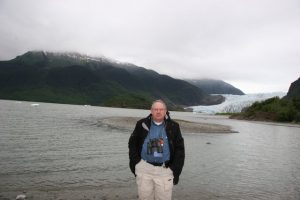Contact the Mechanical Engineering Department
Thermal Fluids research
Project abstracts in NAU Mechanical Engineering
Our research in thermal-fluids spans a wide array of topics ranging from cardiovascular fluid mechanics to nano heat transfer to ocean modeling. Details on some of our research projects in thermal-fluids are described below. Please contact the lead faculty to learn more about any of our research projects.
Research projects
Thermal Radiation from Quantum Convection and Deterministic Quantum Mechanics Accordion Closed

Lead: Peter Vadasz
Keywords: thermal radiation, quantum mechanics
This project is an early concept exploratory research. Predicting motion at the sub-atomic level, for example electrons moving around the nucleus of an atom has been attempted since early last century and led to a probabilistic approach. This approach can provide the odds of finding the electron in specific locations, but cannot specify a definitive explicit location. The applications of this field, called quantum mechanics, are extremely wide. One of the most important applications is radiation heat transfer, such as solar radiation. This type of random processes cannot in general be controlled. However, if quantum mechanics can be shown to be deterministic, then it is likely that it can be controlled, i.e. instead of random and uncontrollable, it might just be deterministically chaotic, and then controllable. Such an outcome may revolutionize a wide range of applications and lead to new engineering technologies. The premise of the research is that the electron is not a particle but rather a compressible fluid. Consequently, one can formulate the continuum set of governing equations for the electron compressible fluid surrounding the atom’s nucleus. The results will provide the quantum convective flow of the charges (the electron compressible fluid) around the nucleus. It is anticipated that the Planck’s constant h, which is a universal constant obtained only experimentally, will be derived theoretically as part of this project. The quantum nature of the sub-atomic phenomena will be retained, however it will not be imposed upfront but rather emerge as a result. The impact of the results on radiation heat transfer and the independent evaluation of radiation properties, such as the emissivity will be one of the engineering outcomes of the theory’s application.
Periodic Freezing of Water and Melting of Ice in Asphalt as a Porous Medium subject to Diurnal Temperature Oscillations Accordion Closed

Lead: Peter Vadasz
Keywords: porous medium, asphalt, periodic freezing and melting
The analysis and solution to a variation of the classical Stefan-Neumann problem of melting and solidification in a porous medium is the topic of this research. The specific novel aspect is the subjecting of the top boundary to periodic freezing and melting conditions and the application of the latter to water saturated asphalt. The anticipated results are that a sequence of chasing fronts from the surface to the interior will emerge.
Ocean Modeling with application to the Environmental Impact on Climate Change due to Global Warming Accordion Closed
Lead: Peter Vadasz
Keywords: climate change, ocean modeling
The objective of this research is the development of a mathematical model for the energy balance in the ocean in order to investigate the effect the thermal expansion of the ocean water column has on the sea level.
Consequently the latter impact on climate change duet global warming can be assessed.
